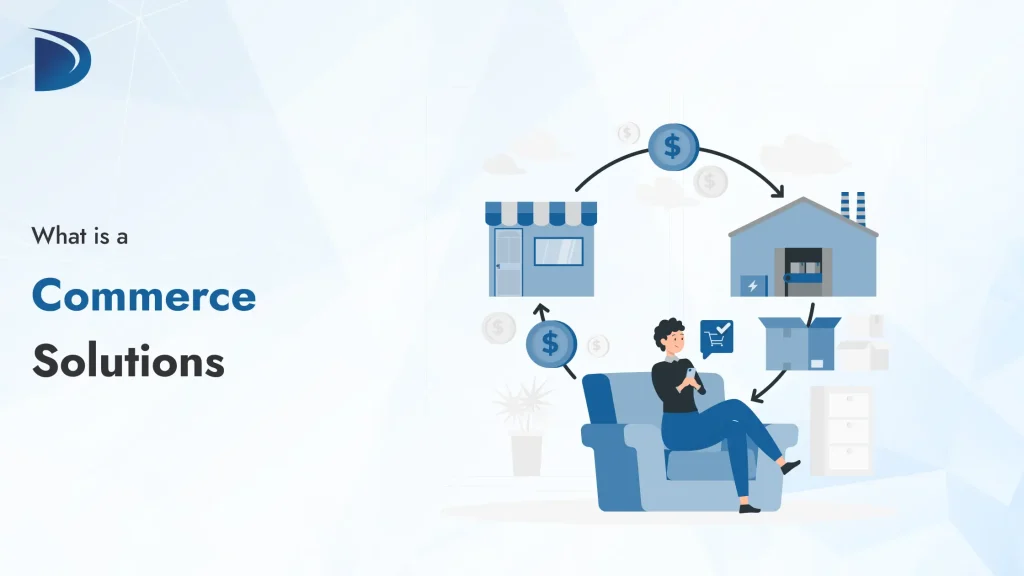Table of Contents
E-commerce solutions are tools, platforms, and services that help businesses create, manage, and grow online stores. These solutions simplify selling products or services online by providing website creation, payment processing, inventory management, and customer support. Whether you are a small business owner or a large enterprise, e-commerce solutions streamline operations and enhance the customer experience.
Understanding the Significance of E-commerce Solutions
Online shopping has become the norm, and e-commerce solutions are now essential for businesses to remain competitive. With global e-commerce sales projected to reach $6.3 trillion by 2026, these robust systems are built to meet customer expectations and manage operations efficiently, providing businesses control and confidence. These solutions allow businesses to:
- Build a professional online presence by creating visually appealing and functional online stores without extensive coding knowledge.
- Streamline operations by automating inventory tracking, order processing, and payment collection.
- Reach a global audience: Connect with customers worldwide and break geographical barriers.
- Enhance Customer Experience: E-commerce solutions go beyond secure payments, fast shipping, and responsive support. They deliver a seamless shopping experience with easy navigation, secure transactions, and quick delivery, ensuring customer satisfaction.
- Boost scalability: Easily scale operations to handle increased traffic or additional product lines as your business grows.
By adopting e-commerce solutions, businesses can save time, reduce costs, and focus on growth instead of technical complexities.
Types of E-commerce Solutions
E-commerce solutions come in various forms to suit businesses of different sizes, budgets, and technical capabilities. The main types are:
- Hosted E-commerce Platforms
- Examples: Shopify, BigCommerce, Wix eCommerce
- Description: These are cloud-based, all-in-one solutions where the provider handles hosting, security, and updates. They’re ideal for beginners or businesses looking for simplicity.
- Pros: Easy to set up, minimal technical knowledge required, built-in security, and automatic updates.
- Cons: Less customization, recurring subscription fees, and dependency on the platform provider.
- Self-Hosted E-commerce Platforms
- Examples: WooCommerce (WordPress), Magento, OpenCart
- Description: These solutions give businesses more control by allowing them to host their store on their servers. They’re suitable for those with technical expertise or unique requirements.
- Pros: High customization, flexibility, and no reliance on third-party platforms.
- Cons: It requires technical knowledge, higher setup costs, and ongoing maintenance.
- Custom-Built E-commerce Solutions
- Examples: Tailored platforms developed by agencies or in-house teams
- Description: Fully customized websites built to meet specific business needs, often for large enterprises with complex requirements.
- Pros: Complete control, unique features, and scalability.
- Cons: High development costs, longer setup time, and ongoing maintenance.
- Marketplace Integrations
- Examples: Amazon, eBay, Etsy integrations
- Description: These allow businesses to sell through established online marketplaces while managing operations via a single platform.
- Pros: Access to large customer bases, simplified setup, and built-in trust.
- Cons: High competition, platform fees, and limited branding control.
Unveiling the Key Features of E-commerce Solutions
A robust e-commerce solution typically includes the following features to ensure a seamless online selling experience:
- Website Builder: Drag-and-drop tools to create professional, customizable storefronts without coding.
- Secure Payment Gateways: Integration with trusted payment providers such as PayPal, Stripe, and Square to ensure safe transactions.
- Mobile-Friendly Design: Responsive templates that work seamlessly on smartphones, tablets, and desktops, catering to the 60% of online shoppers who use mobile devices (Statista, 2024).
- Inventory Management: Tools to track stock levels, manage product variants, and prevent overselling.
- Order and Shipping Management: Features to process orders, calculate shipping costs, and provide tracking updates to customers.
- Marketing and SEO Tools: Built-in tools for search engine optimization, email marketing, and social media integration to drive traffic and conversions.
- Analytics and Reporting: Dashboards to monitor sales, customer behavior, and website performance for data-driven decisions.
- Customer Support Features: Live chat, ticketing systems, and FAQ sections to assist customers and improve satisfaction.
- Security Features: SSL certificates, PCI compliance, and fraud protection to safeguard customer data.
Who Uses E-commerce Solutions?
E-commerce solutions cater to a wide range of users, including:
- Small Businesses and Startups: Entrepreneurs launching their first online store to sell apparel, electronics, or artisanal goods.
- Large Enterprises: Companies managing thousands of products across multiple regions that require advanced scalability and integrations.
- Individual Sellers: Freelancers, artists, or creators selling digital products, handmade crafts, or services.
- Dropshipping Businesses: Retailers selling products without holding inventory, relying on third-party suppliers for fulfillment.
- B2B Companies: Businesses selling wholesale products or services to other businesses through secure, customized platforms.
Benefits of Using E-commerce Solutions
- Cost Efficiency: Reduce the need for physical stores and manual processes, lowering overhead costs.
- 24/7 Availability: Customers can shop anytime, anywhere, increasing sales opportunities.
- Data Insights: Gain valuable information about customer preferences and trends to optimize marketing strategies.
- Global Reach: Expand into international markets without physical expansion.
- Customer Convenience: Offer a seamless shopping experience with easy navigation, secure payments, and fast delivery.
Challenges to Consider
While e-commerce solutions offer many benefits, businesses should be aware of potential challenges:
- Technical Issues: Self-hosted platforms may require troubleshooting and server management.
- Competition: Standing out in a crowded online marketplace can be difficult without strong branding and marketing.
- Ongoing Costs: Subscription fees, transaction charges, and maintenance costs can add up.
- Security Concerns: Data protection and compliance with regulations such as GDPR are critical.
Choosing the Right E-commerce Solution
Selecting the best e-commerce solution depends on several factors:
- Business Size: Small businesses may prefer hosted platforms like Shopify, while larger enterprises may choose Magento or custom solutions.
- Budget: Consider setup costs, monthly fees, and transaction charges.
- Technical Expertise: Select a platform that matches your team’s technical skills or hire professionals for custom solutions.
- Scalability: Ensure the solution can grow with your business and handle increased traffic and product lines.
- Integration: Choose platforms that integrate with your existing tools, such as CRM, accounting software, or marketing platforms.
Conclusion
E-commerce solutions are the backbone of modern online businesses, enabling everyone from solo entrepreneurs to global brands to sell products and services efficiently. These solutions simplify online selling by offering tools to create user-friendly stores, manage inventory, process payments, and engage customers. Choosing the right e-commerce platform for your business can help you attract more customers, streamline operations, and drive sustainable growth in the competitive digital marketplace.

